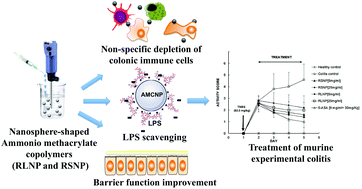Nanosphere-shaped ammonio methacrylate copolymers: converting a pharmaceutical inactive ingredient to efficient therapeutics for experimental colitis†
Abstract
Inflammatory bowel disease (IBD) refers to progressive inflammatory disorders that impair the gastrointestinal tract's structure and function. Given their selective accumulation in inflamed tissues, nanoparticles are promising drug delivery systems for IBD treatment. The hypothesis here was that drug-free nanoscaled cationic ammonio methacrylate copolymers (AMCNP) may have a beneficial therapeutic effect in murine TNBS-induced colitis. Type A and B AMCNP (RLNP and RSNP, respectively) were prepared and characterized in vitro, and were rectally administered in two concentrations (5 and 25 mg ml−1) for the treatment of two grades of murine experimental colitis. The impact of the nanoparticles upon the inflammatory markers, circulating LPS, intestinal permeability and colonic leukocyte populations was examined. Both RLNP and RSNP led to a significant mitigation of mild to moderate experimental colitis, as evident from the substantial reduction of myeloperoxidase (MPO) and alkaline phosphatase (AP) activities (more than two-fold, P < 0.05) and various pro-inflammatory cytokine concentrations (TNF-α, IL-1β, IL-6, IL-12). The best therapeutic efficiency was observed when the particles were used at 5 mg ml−1, while the more cationic RLNP performed superior. When used against a severe grade of colitis, RLNP (5 mg ml−1) resulted in a significant decrease of tissue MPO and TNF-α. It was found that treatment with AMCNP resulted in significant intestinal immune cell depletion, intestinal barrier function improvement, and 1.5–2.5 times reduction of the systemic endotoxin concentration. These findings highlighted the fact that nanoscaling endows the cationic amphiphilic AMCs unique therapeutic properties, which help mitigate murine experimental colitis in the absence of any drug load. The results also provided a glimpse of possible underlying mechanisms through which nanoscaled AMCs might have exerted their therapeutic effect within this context.



 Please wait while we load your content...
Please wait while we load your content...